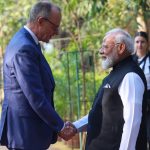

 Africa Day is a time for rejoicing and celebration of the indomitable spirit of over a billion African people who are dreaming afresh a new narrative of renaissance, resurgence and renewal. This year, the Africa Day celebrations have a special resonance as the 54-nation African Union commemorates the golden jubilee of the formation of the Organisation of African Unity (OAU), its progenitor and the torch-bearer of African unity and solidarity
Africa Day is a time for rejoicing and celebration of the indomitable spirit of over a billion African people who are dreaming afresh a new narrative of renaissance, resurgence and renewal. This year, the Africa Day celebrations have a special resonance as the 54-nation African Union commemorates the golden jubilee of the formation of the Organisation of African Unity (OAU), its progenitor and the torch-bearer of African unity and solidarity
It’s time for Africa
For India, a co-sharer of Africa’s agonies and achievements that hark back to the shared struggle against colonisation and apartheid and a proactive partner in the unfolding Afro-optimism, the AU’s 50th year party in Addis Ababa has a deeper emotive and intellectual connection. Fittingly, Vice-President Hamid Ansari will be representing India at the AU Commemorative Summit May 25, where he is expected to reaffirm New Delhi’s unflinching commitment to the empowerment and resurgence of a continent that has shed diffidence and is finding its place under the global sun.
Five years of India-Africa Summit
Amid the jubilations and ceremonial grandeur that often goes with such milestone moments, not many will notice that 2013 is also an important marker in India’s multi-faceted relationship with the vibrant multi-cultural continent and the AU. It was in the summer of 2008 that India institutionalised its summit-level engagement with the African continent, with the AU as the chief interlocutor from the African side.
Called the India-Africa Forum Summit, the first edition was held in New Delhi in April, 2008, followed by the second summit in Addis Ababa in May 2011. India is an observer at the AU, but the IAFS process underlined the centrality of the AU in India’s Africa policy. In a seminal sense, the AU is the first pillar of India’s multi-tiered cooperative partnership with Africa which also works successfully at the levels of bilateral relations and at the regional level through the Regional Economic Communities (RECs).
Put together, this unique three-tiered structure forms the basis of the India-Africa Forum Summit at which Director-General (DGs) of eight RECs, leaders of the countries chairing eight RECs, the chair of the AU, the past chair of the AU and the chairperson of the African Union Commission are among those invited. Under this summit process, India and the AU launched in March 2010 an ambitious and all-encompassing action plan that, among other things, sought to develop Africa’s impulses towards regional integration and the African unity – the prime theme of the May 25 golden jubilee AU summit in Addis Ababa which is themed “2013, Year of Pan-Africanism and African Renaissance.”
African renaissance
African renaissance has lately become a buzzword in elite economic and diplomatic circles, but for India it appears natural that given its vast and variegated natural resources, and, most importantly, the energy, exuberance and enterprise of the African people, the 54-nation continent is finally catching up with its destiny. Trade and investment surely matter in the 21st century world in which economics is the prima donna, but India has consciously eschewed brute mercantilism in its relations with Africa.
“The commerce between India and Africa will be of ideas and services, not of manufactured goods against raw materials,” as Mahatma Gandhi, who honed his techniques of passive non-resistance on the African soil, said famously. It’s been decades since Gandhi spoke  about deeper intellectual and spiritual connections between India and Africa; much water has flowed since then. Africa, once a victim of colonialism, has now embarked on a new journey of economic liberation in a globalised world. In fact, there is a dramatic transformation in the global perception of Africa from a “Hopeless Continent” to a “Cape of Good Hope.” And it’s not just manufactured hype; statistics sometimes lie, but Afro-optimism is for real: six of the world’s fastest-growing economies are in Sub-Saharan Africa; more than thirty African countries are now functioning democracies. The continent is expected to hum along at the annual growth rate of 6 per cent.
about deeper intellectual and spiritual connections between India and Africa; much water has flowed since then. Africa, once a victim of colonialism, has now embarked on a new journey of economic liberation in a globalised world. In fact, there is a dramatic transformation in the global perception of Africa from a “Hopeless Continent” to a “Cape of Good Hope.” And it’s not just manufactured hype; statistics sometimes lie, but Afro-optimism is for real: six of the world’s fastest-growing economies are in Sub-Saharan Africa; more than thirty African countries are now functioning democracies. The continent is expected to hum along at the annual growth rate of 6 per cent.
India-AU partnership
The AU, the continent’s premier institution for promoting accelerated socio-economic integration of the continent, has played an important role in spurring this re-emergence of the African continent.
Building on enormous goodwill it enjoys across the continent, India has consistently backed the AU-led peace and development initiatives and created a multi-layered Africa policy that revolves around the trinity of trade, technology and training.
The rise of India and Africa
The resurgence of Africa has coincided with the rise of India as a global player, development partner and investor. The two narratives are now getting intertwined: be it trade, technology, training or reform of global governance, the multi-faceted ties between India and Africa are blossoming and finding new areas of convergence.
Connecting to Africa
The AU has also a pivotal role in actualising India’s capacity building and human resource development projects in Africa. In fact, it was at the pan-African parliament in Cape Town in 2004 that the then President A.P.J. Abdul Kalam first unveiled the vision of a Pan-African e-network, a pioneering initiative that seeks to bridge the digital divide in the continent and bring benefits of tele-education and tele-medicine to African people. Seven years hence, that dream has not only become real, but has become synonymous with innovation-driven transformational diplomacy. More than 40 countries have already signed on to the network. Rhetoric does not impress ordinary people over much; the smiling faces of African students taught virtually by Indian professors and Africans who have found a new life through long-distance consultancy from Indian specialists sitting thousands of miles away tell their own story.
India’s Africa Policy
Buoyed by the success of the e-network, India has pledged to set up over hundred training institutes across Africa at the two summits in New Delhi and Addis Ababa. It could be a potential game-changer of sorts in Africa’s quest to become a knowledge-driven society. Although many of these institutions are to be decided through bilateral consultations, India has left it to the AU to decide the location and modalities of pan-African training centres. This process of consultation has become a distinctive approach of India’s engagement with Africa under the broader paradigm of the south-south cooperation.
This multi-dimensional engagement has created win-win outcomes for both sides. Bilateral trade between India and Africa has gone up manifold from less than a billion dollar barely two decades ago to over $60 billion. If the Afro-enthusiasm among the Indian businesses is anything to go by, the two sides can easily surpass the target of scaling up bilateral trade to $90 billion by 2015. India has pledged around $8 billion soft loans (lines of credit) for a host of development projects in the continent.
It’s not just trade that is thriving; the India-Africa partnership is acquiring a strategic cast with increased cooperation in combating piracy and terrorism and addressing a host of cross-cutting issues like the reform of global governance architecture. Peace and security is of prime importance: more than 6,500 Indian soldiers are proactively engaged in peacekeeping in different countries in Africa. India is home to around 15,000 African students, with most of them paying for themselves. By 2014 it is expected the number will go up to 22,000.
Sharing the African Dream
In many ways, the India-Africa cooperation is becoming a genuine two-way street. Marrying African resources and Indian expertise, as former Ghana president John Kufuor says, is a win-win combination.
“The African continent is now searching for new opportunities to partner with India to build the right capacity for a new prosperous, hunger-free, disease-free and poverty-free Africa. This is achievable through the transfer of human skills and technology from India to Africa,” writes Malawi’s former president Bingu wa Mutharika in ‘Sharing the African Dream’.
At the end of the day, diplomacy is not about chessboard games of power play, but about real people and their dreams and aspirations. Talking of India and Africa, it’s about unleashing the potential of two billion people who are itching to fashion their own destiny in a mutating world order.
(Manish Chand is Editor-in-Chief of India Writes, an online magazine and journal, www.indiawrites.org, focused on international relations, the India Story and emerging powers. He is Editor of Two Billion Dreams: Celebrating India-Africa Friendship and co-editor of Engaging with a Resurgent Africa).
Author Profile

- Manish Chand is Founder and Editor-in-Chief of India Writes Network (www.indiawrites.org) and India and World, a pioneering magazine focused on international affairs. He is CEO, Centre for Global India Insights, an India-based think tank focused on global affairs.
Latest entries
 India and the WorldFebruary 7, 2026Modi hails interim India-US trade deal, Goyal says no concessions made on agriculture
India and the WorldFebruary 7, 2026Modi hails interim India-US trade deal, Goyal says no concessions made on agriculture India and the WorldFebruary 2, 2026Trump announces trade deal with India, Modi ‘delighted’
India and the WorldFebruary 2, 2026Trump announces trade deal with India, Modi ‘delighted’ India and the WorldJanuary 31, 2026Palestinian minister bats for mediatory role for India in ending Gaza conflict
India and the WorldJanuary 31, 2026Palestinian minister bats for mediatory role for India in ending Gaza conflict India and the WorldJanuary 13, 2026India, Germany raise the bar for defence, economic ties
India and the WorldJanuary 13, 2026India, Germany raise the bar for defence, economic ties







